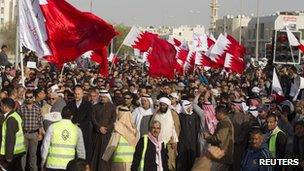Bahrain and Belarus named 'enemies of the internet'
- Published

Bahrain and Belarus have been added to Reporters Without Borders' annual list of "enemies of the internet".
They join 10 other nations on thecampaign group's register of statesthat restrict net access, filter content and imprison bloggers.
India and Kazakhstan have also joined RWB's list of "countries under surveillance" because of concerns that they are becoming more repressive.
The body says 2011 was the "deadliest year" yet for so-called "netizens".
It says at least 199 arrests of internet campaigners were recorded over the year - a 31% increase on 2010.
It adds that China, followed by Vietnam and Iran currently hold the largest number of netizens in jail.
New entries
RWB said it had added Bahrain to its list after thedeath of Zakariya Rashid Hassan. It said the forum moderator had maintained a website focused on stories about his birthplace, al-Dair, ahead of his arrest on 9 April.
It said Mr Hassan was charged with disseminating false news and calling for the overthrow of his country's government before he died, six days after being detained.
RWB says the country's law authorities have also arrested other netizens, smeared free speech activists and disrupted communications at the time of demonstrations.
Bahrain's government expressed a number of concerns about the report, which it said failed to "present the reality of the situation" there.
Several positive steps had been taken towards reforming the media sector since the publication of a report by the Bahrain Independent Commission of Inquiry (BICI) into last year's crackdown on anti-government protests, it said, including relaxing censorship and increasing the range of political opinions in the media.
In Belarus, the campaign group says, President Alexander Lukashenko's government has increased the number of blocked websites and arrested some bloggers while inviting others to "preventative conversations" with the police during which they are pressured not to cover protests.
It says the regime has also used Twitter to send messages designed to intimidate demonstrators. It adds that the country's main internet service provider has diverted users to sites containing malware when they tried to log into the Vkontakte social network.
Elsewhere RWB accuses China and Syria of hiring bloggers to troll sites containing posts from cyber-dissidents, and then flood the pages with messages supporting the governments.
It raises concern that Iran's President Mahmoud Ahmadinejad has announced plans to create a "clean" web with its own search engine and messaging service, and says Vietnam has attacked Catholic networks and campaigners trying to raise awareness about environmentally damaging bauxite mines.
Watch list
RWB said India had joined its "surveillance" list after stepping up internet monitoring efforts following 2008's Mumbai bombings. It claims that the country's national security policy undermines the protection of users' personal data.
Kazakhstan was added to the list after being said to have cut communications around the city of Zhanaozen during a riot and having introduced new "repressive internet regulations".
Australia remains on the register because of its government's efforts to introduce a mandatory web filtering system to block content deemed inappropriate, such as child pornography. RWB says it is concerned that the system would not be managed in a transparent matter.
France is also on the list because of its "three strikes" policy on illegal downloads which can lead to net access being suspended.
The organisation also notes that a blogger became Egypt's first political prisoner of the post-Mubarak era after Maikel Nabil Sanad was convicted for criticising the armed forces.
Although the UK does not make either of RWB's list, the body notes that the UN has raised concerns about its Digital Rights Bill aimed at defending copyright.
It also says thatBlackberry's decision to assist the authoritieswithout a prior court order during the London riots is "a worrying development".
RWB also highlights the role of firms which provide monitoring equipment and software to repressive regimes.
It says that western companies have been criticised for activities in Syria, Egypt and Libya when Col Muammar Gaddafi's regime was still in charge.
The organisation notes that the European Parliament has adopted a resolution supporting tougher export controls, and that a bill with a similar aim is being considered by US lawmakers.
- Published9 March 2012
- Published14 March 2012
- Published15 January 2012